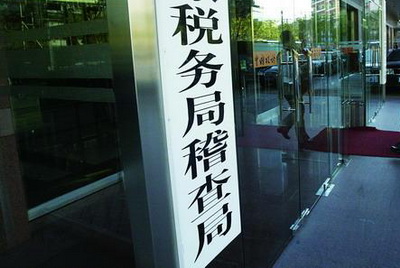China Launches Second Round of Taxation Inspections in Bid to Boost Revenue
News, Cover, Issue 459, March 8, 2010
Translated by Liu Peng
Original article: [Chinese]
China's State Administration of Taxation (SAT) has launched a second round of tax inspections in a bid to squeeze more tax revenue from China's business sector.
The SAT has already set a target of collecting no less than the equivalent of 1.5 percent of the total national industrial and commercial tax revenue in "additional tax" this year, the Economic Observer learned.
A rough calculation indicates that this means SAT is aiming to collect over 100 billion yuan via strict investigations of the tax returns lodged by a select few large corporations over recent years in 2010.
This is the first time that SAT has set a detailed target for local tax auditing agencies to collect the "additional tax" in ten years.
Since last October, the SAT began asking local tax collection agencies to carry out audits of the tax declarations of millions of domestic companies. This included 63 large companies which were ordered to first conduct internal reviews of the tax declarations they had lodged over the past three years.
The move was made at a time when the country had registered six consecutive months of negative tax revenue growth and it seemed likely that China would not be able to achieve it's fiscal revenue or tax revenue growth target for the year.
However, by the end of the year, an additional 119.2 billion yuan in additional tax revenue had been collected by the SAT via these inspections, which was double the figure for 2008. An anonymous expert estimated that without this additional tax revenue, SAT would not have been able to meet its 8 percent growth target for the year - which it actually exceeded by registering 8.2 percent growth in tax revenue.
Second Round of Inspections
This year, SAT is requiring local tax collection agencies to conduct random spot-checks of the internal audits completed by 63 large companies. Meanwhile, SAT also plans to begin a new round of tax inspections focused on key industries.
Local branches of SAT will conduct inspections of pharmaceutical companies, real estate developers and companies involved in construction and transportation in 2010, and will carry out random checks of tax declarations submitted by for-profit medical and educational institutions as well as individuals who earn over 120,000 yuan a year.
In addition, in line with experience from Shenzhen municipality, many local taxation agencies will strengthen their monitoring of tax owed by individuals and companies on the profits made on the sale of formerly non-tradable shares.
Last year, with the cooperation of the Shenzhen stock exchange and local securities registration companies, the Shenzhen municipality branch of the SAT was able to monitor sales of formerly non-tradable shares. When they requested internal audits of the tax declarations of some of the companies involved last year, one company made a supplementary payment for income tax worth 30 million yuan.
Furthermore, the EO learned that local taxation agencies also plan to conduct inspections of listed companies focusing on whether they are declaring tax on income raised from asset appreciation and equity transfer. They'll also investigate state-owned enterprises for any tax owed on income raided by acquisition of other companies' assets.
In the implementation of this round of inspection, SAT has asked that its local branches establish a database that allows them to share information with the local audit bureau, administration for industry and commerce, customs, public security bureau as well as the procuratorate and courts.
Tax Advice Industry
The industry of offering tax advice to companies took off in 2009 as companies worried about the possibility of being inspected by SAT, flocked to accounting firms and tax consultative agencies to seek advice.
Aside from these professional agencies, The Economic Observer discovered that many companies had also been referring to an article titled "Skills and Principles for Companies Carrying out an Internal Review Tax Inspection" (Click on the links for Part I and Part II of the Chinese version) authored by Pan Weiming, a tax official from the Guangxi Zhuang Autonomous Region, for advice.
In the article, the author explains what the tax department expects from companies in terms of the internal reviews and also estimates how much in additional tax they are expected to pay.
One accountant from a company admitted to EO that as his company had no experience in carrying out an internal tax review, they found the article very helpful.
The EO learned that it's not just the tax department that is cracking down in order to reverse worrying drops in revenue.
Due to a less-than-optimistic outlook for customs revenue in 2010, total revenue grew by only 0.6 percent in 2009, customs officers at all levels have begun to strengthen their inspection of companies, focusing on financial reports, production and sales performances and warehouse management figures.
A representative of a consulting firm in Shenzhen which organizes events in China's major cities offering advice to companies about how they can deal with such inspections, told the EO that a lot of companies had registered to listen to the 3,000-yuan-a-session lecture.
Links and Sources
Economic Observer: Taxing Times
Economic Observer: Ministry of Finance Takes Aim at Tax Dodge Among China's High Earners
Economic Observer: Tax Reform in 2008
SZACC.com: Advice to Companies on Internal Tax Audits (Chinese)
Caijing: image
The views posted here belong to the commentor, and are not representative of the Economic Observer |




















